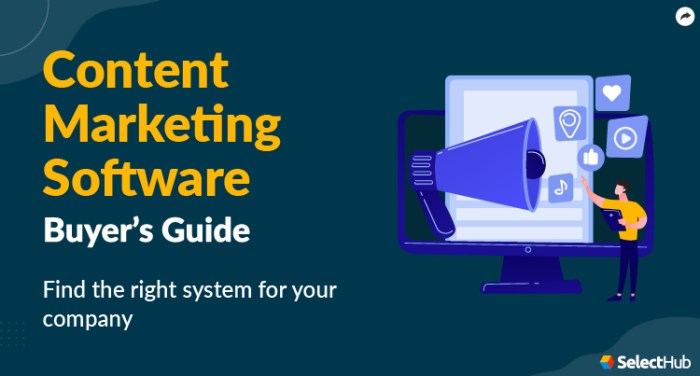Content marketing software is essential for businesses looking to enhance their marketing strategies and engage their audience effectively. In an ever-evolving digital landscape, these tools provide a robust framework for planning, executing, and analyzing content marketing efforts. By understanding the various types of software available and their unique features, marketers can leverage technology to optimize their campaigns.
This guide delves into crucial aspects such as the benefits of utilizing content marketing software, criteria for selecting the right platform, and future trends that are set to redefine the field. From improving productivity to enhancing audience engagement, the insights presented here aim to empower marketers to make informed decisions.
Understanding Content Marketing Software
Content marketing software plays a crucial role in the digital marketing ecosystem. This category of tools is specifically designed to aid marketers in creating, managing, and distributing their content effectively. The primary purpose of content marketing software is to streamline the process, enhance collaboration, and ultimately improve the reach and impact of marketing efforts.
The key features that differentiate content marketing software from other tools include advanced content creation capabilities, content calendar management, optimization tools, audience analytics, and performance tracking. These features help marketers understand their audience better and tailor their strategies accordingly. Over the past decade, content marketing software has evolved significantly, transitioning from basic content management systems to robust platforms that integrate artificial intelligence and machine learning for enhanced personalization and targeting.
Types of Content Marketing Software
The market offers a variety of content marketing software types, each addressing different aspects of the content creation and distribution process. Understanding the various categories is essential for marketers to choose the right tools for their needs.
- Content Creation Tools: These tools assist in writing, editing, and formatting content. They often include features such as grammar checks, style guides, and collaboration options to enhance the quality of the output.
- Content Distribution Platforms: These platforms help marketers distribute their content across various channels, ensuring maximum visibility and engagement. They often include social media management features and email marketing integration.
- Tools: Essential for optimizing content for search engines, these tools provide research, on-page suggestions, and performance tracking to improve organic reach.
- Analytics and Reporting Tools: These tools analyze content performance and audience engagement, providing insights that inform future strategies and adjustments.
Benefits of Using Content Marketing Software
The adoption of content marketing software significantly enhances productivity for marketers. By automating routine tasks, such as scheduling and analytics reporting, teams can devote more time to strategic planning and creative processes.
These tools also improve content strategy and audience engagement by providing valuable insights into audience behavior and preferences. Through data analysis, marketers can refine their messaging and targeting, leading to more effective campaigns. Furthermore, content marketing software can be cost-effective for businesses of various sizes, allowing even smaller companies to compete with larger organizations by leveraging advanced tools without substantial investments.
Selecting the Right Content Marketing Software
Choosing the right content marketing software requires careful consideration of multiple criteria. Key factors include the scalability of the software, user-friendliness, integration capabilities with existing tools, and the specific features offered.
When comparing popular content marketing platforms, it is essential to look at aspects such as pricing models, feature sets, and user reviews. Some leading options include HubSpot, SEMrush, and Buffer, each offering unique strengths tailored to different marketing needs.
A practical checklist for businesses evaluating content marketing software options includes:
- Determine the budget and pricing structure.
- Assess integration with current tools and systems.
- Review user feedback and case studies.
- Identify the necessary features based on marketing goals.
- Consider scalability for future growth.
Implementing Content Marketing Software

Integrating content marketing software into existing marketing strategies involves several key steps. Initially, teams should conduct a thorough assessment of current workflows to identify areas for improvement. Following this, the software can be implemented gradually, starting with basic features before scaling up to more advanced functionalities.
Training team members is critical for successful adoption. Providing comprehensive onboarding sessions, ongoing support, and resource materials can facilitate smoother transitions. Common challenges during implementation may include resistance to change and integration issues. Addressing these proactively through clear communication and support will mitigate potential setbacks.
Measuring Success with Content Marketing Software

To evaluate the effectiveness of content marketing efforts, various metrics should be tracked. Key performance indicators (KPIs) include website traffic, engagement rates, conversion rates, and social media shares. Monitoring these metrics enables marketers to assess the impact of their strategies accurately.
Generating reports from content marketing software is essential for showcasing results to stakeholders. These reports can include visual data representations, such as graphs and charts, making insights more accessible. Adjusting strategies based on performance analytics is crucial for continuous improvement, allowing marketers to pivot their approach based on real-time data.
Future Trends in Content Marketing Software

Emerging trends and technologies are shaping the future landscape of content marketing software. One significant trend is the increased use of artificial intelligence and machine learning, which allows for more personalized content experiences and automated insights that enhance decision-making.
As businesses continue to demand more sophisticated solutions, we can expect content marketing software to evolve further in the next five years. For instance, integration of voice search optimization and enhanced data privacy features will likely become standard as marketers adapt to changing consumer behaviors and regulatory environments.
Epilogue
In summary, content marketing software is not just a trend but a vital asset for marketers seeking to achieve measurable results. By embracing these tools and understanding their capabilities, businesses can navigate the complexities of content creation and distribution with confidence. As we look to the future, staying ahead of emerging trends will be key to maximizing the impact of content marketing strategies.